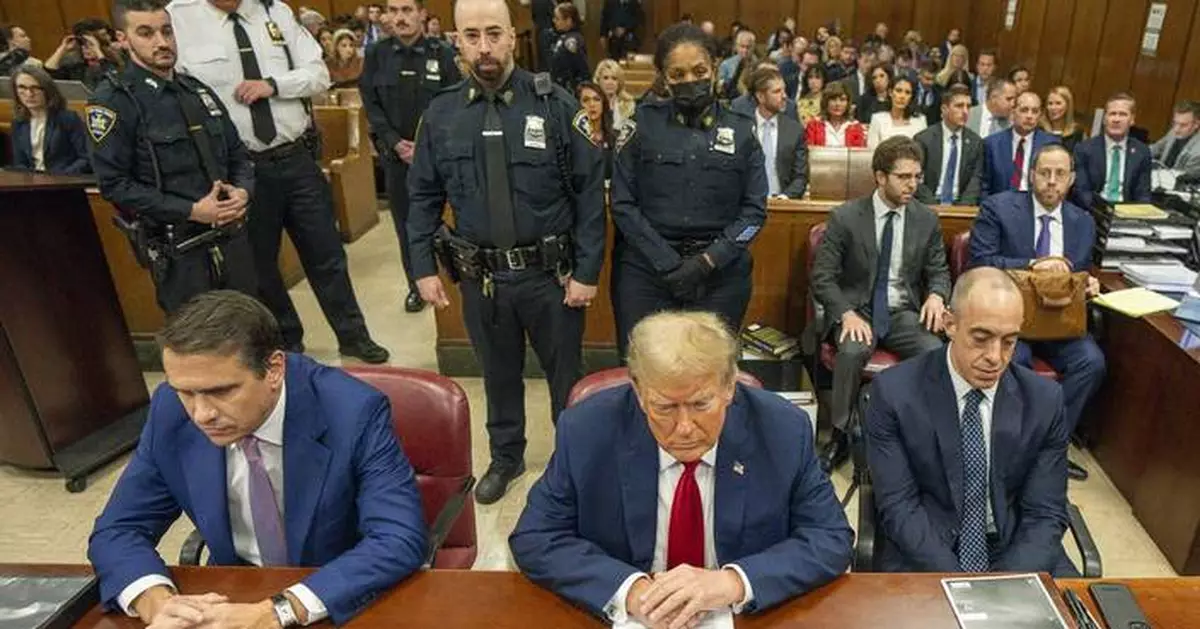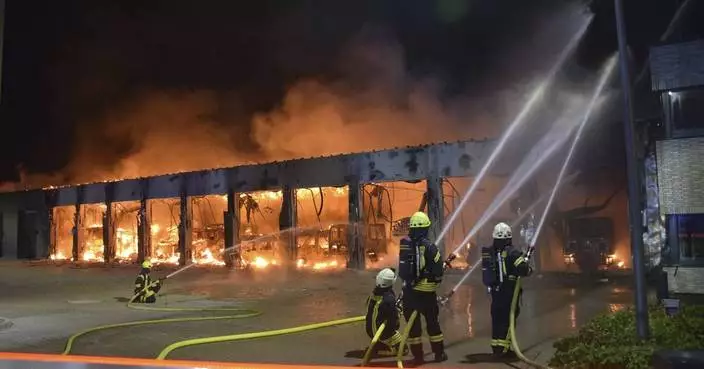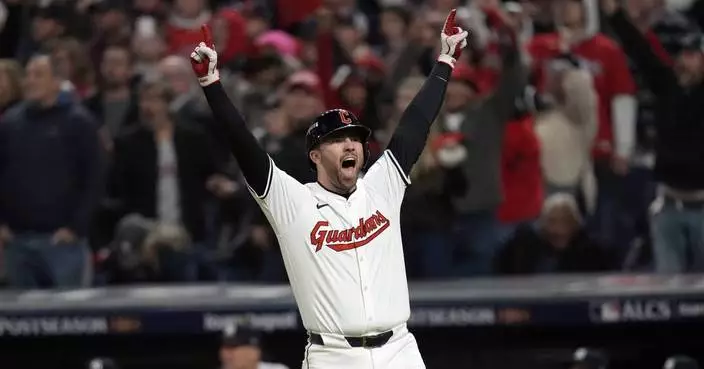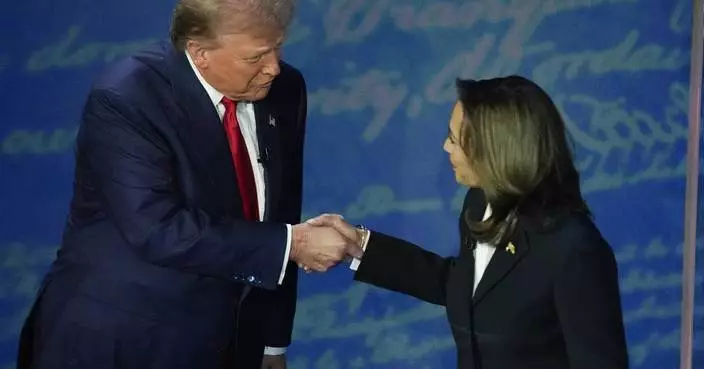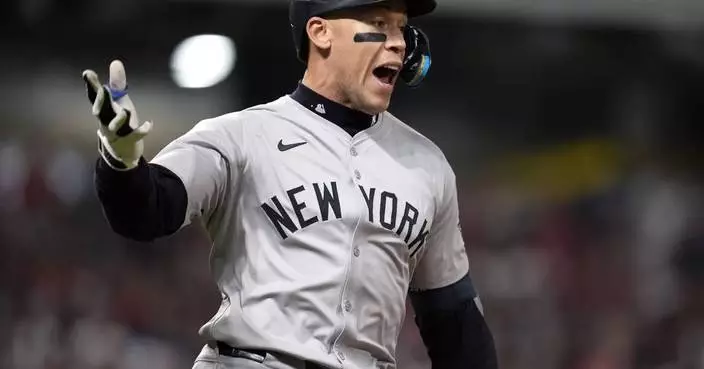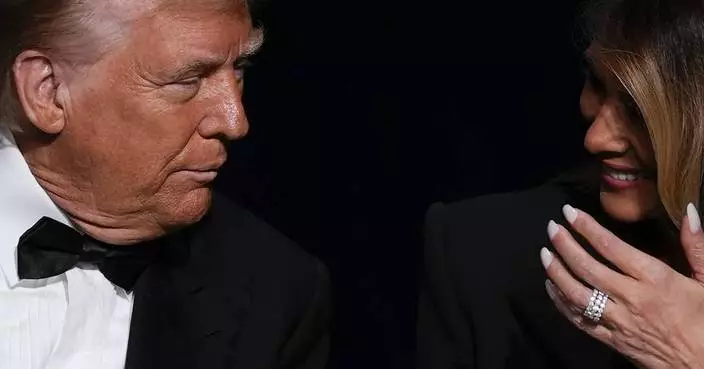NEW YORK (AP) — Testimony in the hush money trial of Donald Trump is set to conclude in the coming days, putting the landmark case on track for jury deliberations that will determine whether it ends in a mistrial, an acquittal — or the first-ever felony conviction of a former American president.
Jurors over the course of a month have heard testimony about sex and bookkeeping, tabloid journalism and presidential politics. Their task ahead will be to decide whether prosecutors who have charged Trump with 34 counts of falsifying business records have proved their case beyond a reasonable doubt.
Here's a look at what the two sides have argued, who has been missing from the case, what to listen for in the final days and what prosecutors will have to prove to secure a conviction.
Through witnesses including a porn actor, a veteran tabloid publisher and longtime Trump aides, the prosecution aimed to link the presumptive Republican nominee for the White House this year to a hush money scheme during the 2016 presidential campaign that resulted in the filing of phony business records to mask the alleged conspiracy.
Jurors heard testimony that two women and a doorman were paid tens of thousands of dollars to keep quiet during that campaign about stories that, had they emerged, could have embarrassed Trump. Jurors heard claims of sex, saw copies of texts, emails and checks and listened to a secret recording in which Trump and his then-lawyer can be heard discussing a plan to buy the silence of a Playboy model.
One witness, David Pecker, the former publisher of the National Enquirer and a longtime Trump friend, testified that he had agreed to be the “eyes and ears" of the Trump campaign by alerting it to any negative stories about him.
Actor Stormy Daniels told jurors, in occasionally graphic terms, about a sexual encounter she says she had with Trump in 2006; he denies the whole thing. She described being offered $130,000 by Trump's then-lawyer and personal fixer, Michael Cohen, to remain silent after she said she was looking for ways to sell the story and get it out there.
Cohen, the prosecution's star witness, spent days on the stand recounting what he said was Trump's role in authorizing the hush money payments. Cohen described Trump as anxious that stories alleging extramarital sex could harm his campaign standing with female voters and said the then-candidate had directed him to suppress the stories, quoting him as saying exhortations including, “Just do it” and “We need to stop this from getting out.”
Trump's legal team has not yet called witnesses, and it remains unclear what exactly his lawyers will do when it is their turn to present evidence.
But they have signaled through their questioning of the prosecution's witnesses specific areas where they think they can sow doubt for the jury, contesting along the way the foundational premises of the case.
They have disputed Daniels' account of a hotel suite sexual encounter, with the actor facing an aggressive cross-examination from a defense lawyer who said at one point, “You have made all of this up, right?” Daniels said no.
And they have suggested that Trump's celebrity status made him an easy extortion target. They grilled the Los Angeles lawyer who negotiated Daniels' deal about other celebrities from whom he had previously “extracted” money in exchange for a client's silence.
But the most consequential cross-examination, by far, has been that of Cohen. The defense has tried to depict him as a fame-seeking fabulist desperate to contribute to a Trump conviction.
The cross-examination began in splashy fashion, with Trump attorney Todd Blanche asking the former fixer if he recalled referring to the lawyer by an expletive on TikTok last month. Prosecutors objected, the judge summoned the parties to the bench and the question was stricken. But the point was clear.
Over the course of hours, Blanche refreshed Cohen's recollection about a litany of colorful but often profane monikers he had assigned Trump — “Cheeto-dusted cartoon villain” was one — as a way to paint Cohen as egregiously biased, blinded by hatred and therefore not credible.
There was also an avalanche of questions about Cohen's past crimes and lies. Blanche forced Cohen to acknowledge that he fibbed under oath during his own 2018 plea hearing about not feeling pressure to plead guilty. In a dramatic moment, Blanche suggested that Cohen had not told the truth when he said he spoke to Trump about the Daniels payment before wiring her lawyer $130,000.
Blanche confronted Cohen with texts indicating that what was on his mind, at least initially, during the phone call were harassing calls he was getting from an apparent 14-year-old prankster.
The strategy was predictable given Cohen's significance to the case but it is too soon to tell how it landed with the jury.
Multiple characters pivotal to the saga have been name-dropped in court but have been notably absent from the witness stand.
One is Karen McDougal, a Playboy model who has said she had an affair with Trump and received $150,000 from the National Enquirer in a hush money deal that Cohen helped broker. Keith Schiller, Trump's bodyguard, was described in court as the person who asked Daniels for her phone number on Trump's behalf and was an important conduit for Cohen when he needed to reach Trump.
And then there's Allen Weisselberg, the former Trump Organization chief financial officer now serving a five-month jail sentence for lying under oath in the New York attorney general’s civil fraud case against Trump.
Weisselberg did not testify in the hush money trial but he matters because, according to Cohen, he was present for a Trump Tower discussion that arguably most directly links Trump and the reimbursements at the center of the case that prosecutors say are fraudulent.
Cohen says the 2017 Trump Tower meeting occurred on the cusp of Inauguration Day and was where he, Trump and Weisselberg hammered out the mechanics of reimbursing him for the Daniels hush money payment. There, Cohen said, they agreed that the lawyer would receive a total of $420,000 in monthly installments for what would be billed — deceptively, prosecutors say — as legal services.
“He approved it,” Cohen testified. "And he also said: ‘This is going to be one heck of a ride in D.C.”’
Whether jurors will have wanted to have heard from Weisselberg is uncertain, but in a case that centers more on paperwork than sex, the account of that meeting is likely to be held up by prosecutors as a vital piece of evidence and it will be important to see how they return to it as they wrap up their case with closing statements.
To convict Trump of felony falsifying business records, prosecutors must convince jurors beyond a reasonable doubt that he not only falsified or caused business records to be entered falsely, but that he did so with intent to commit or conceal another crime. Any verdict must be unanimous.
Prosecutors allege that Trump logged Cohen’s repayment as legal expenses to conceal multiple other crimes, including breaches of campaign finance law and a violation of a state election law alleging a conspiracy to promote or prevent an election.
In his opening statement, Assistant District Attorney Matthew Colangelo told jurors the case “is about a criminal conspiracy and a cover-up — an illegal conspiracy to undermine the integrity of a presidential election, and then the steps that Donald Trump took to conceal that illegal election fraud.”
Specifically, prosecutors contend, the payments to McDougal, Daniels and the doorman violated federal restrictions on corporate and individual campaign contributions and were meant to conceal damaging information from the voting public.
Among other evidence, jurors heard testimony about Cohen’s 2018 guilty to a campaign finance crime and the National Enquirer’s nonprosecution agreement and $187,500 fine for the McDougal payment, which the Federal Election Commission considered an illegal corporate contribution to Trump’s campaign.
New York also has a misdemeanor falsifying business records charge, which requires proving only that a defendant made or caused the false entries, but it is not part of Trump’s case and will not be considered by jurors.
Tucker reported from Washington.
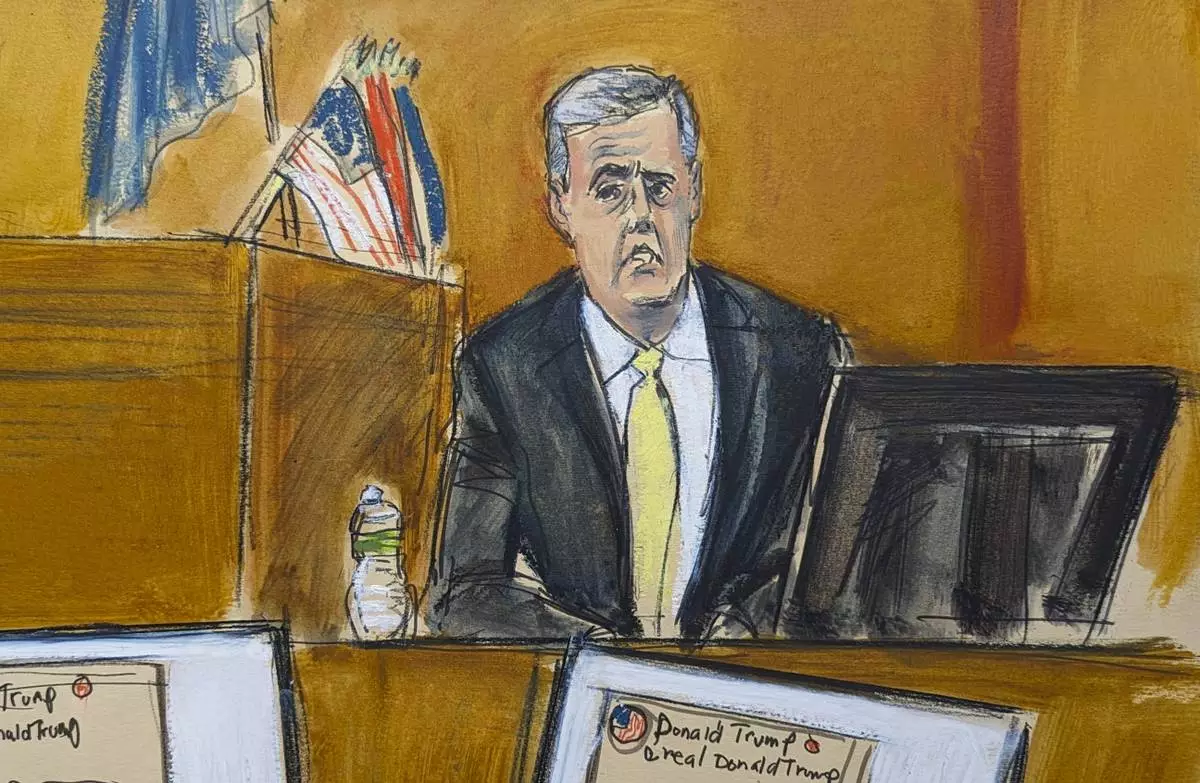
Michael Cohen testifies on the witness stand during cross examination at Donald Trump's hush money trial in Manhattan criminal court, Thursday, May 16, 2024, in New York. (Elizabeth Williams via AP)
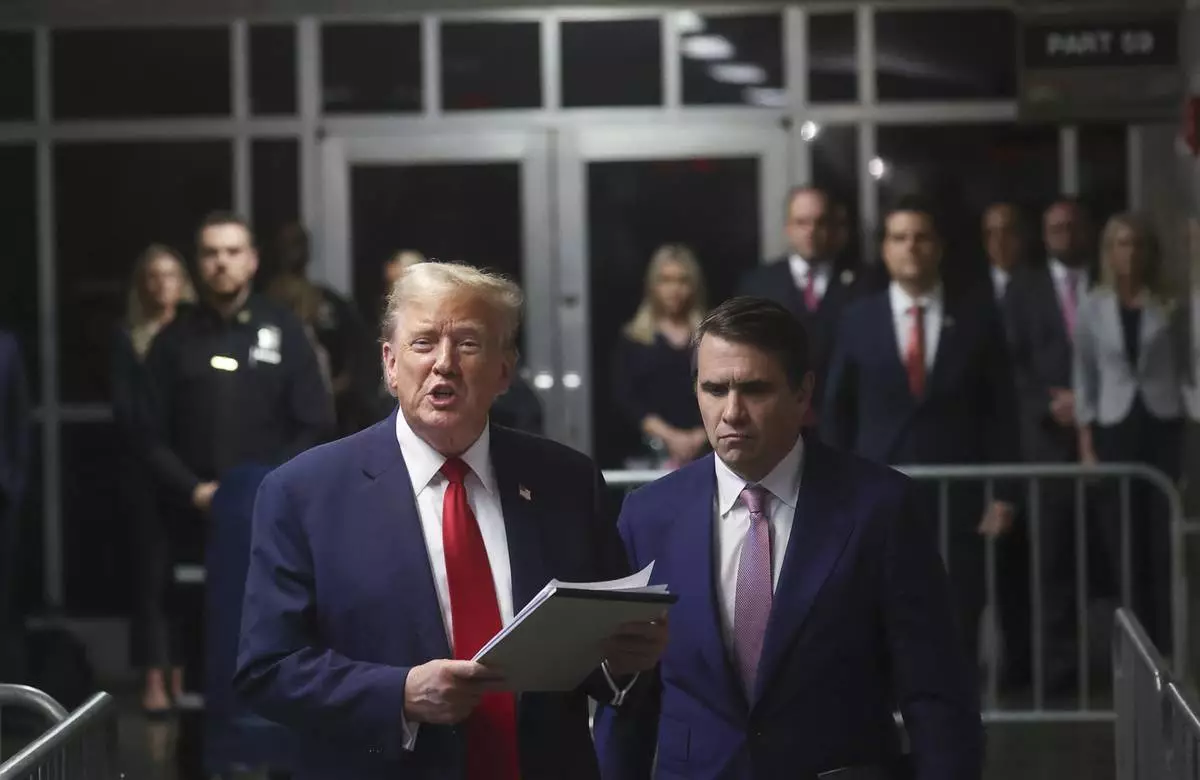
Former President Donald Trump speaks to the media, while his lawyer Todd Blanche listens, after the day's court session for his trial at Manhattan criminal court, Thursday, May 16, 2024, in New York. (Mike Segar/Pool Photo via AP)
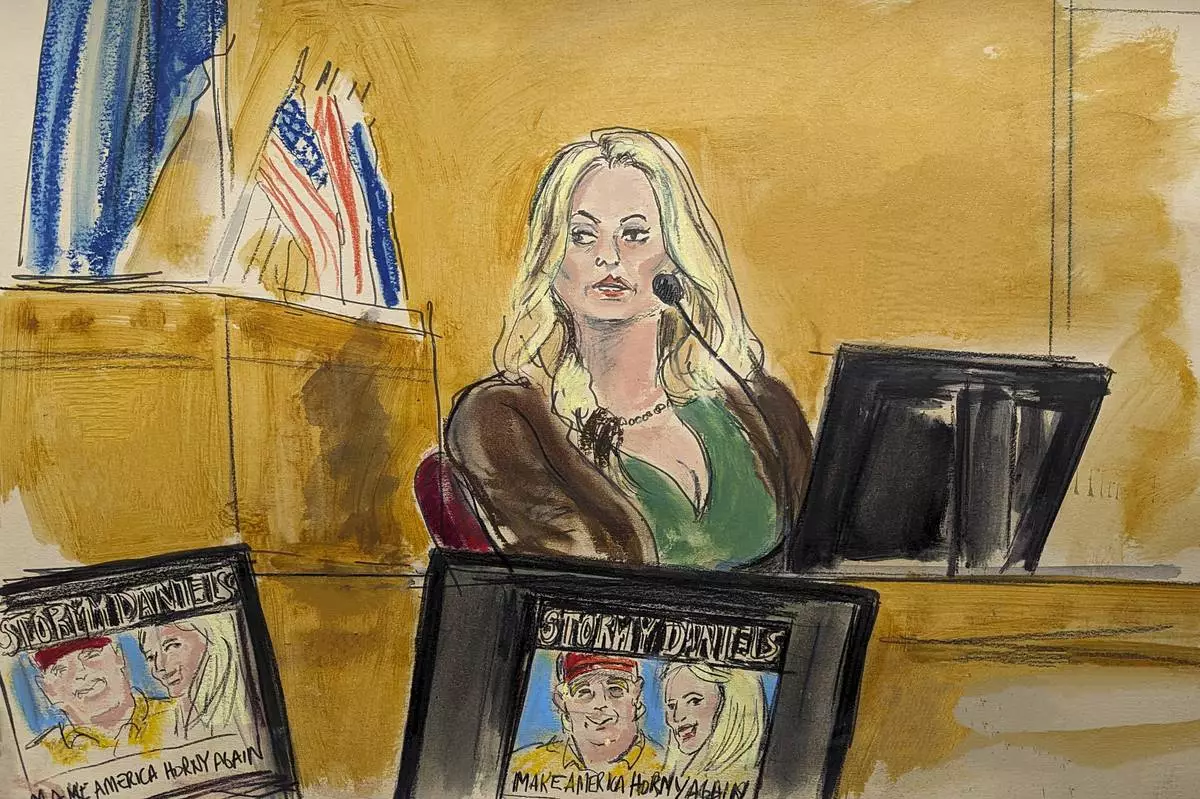
Stormy Daniels testifies on the witness stand as a promotional image for one of her shows featuring an image of Trump is displayed on monitors in Manhattan criminal court, Thursday, May 9, 2024, in New York. (Elizabeth Williams via AP)
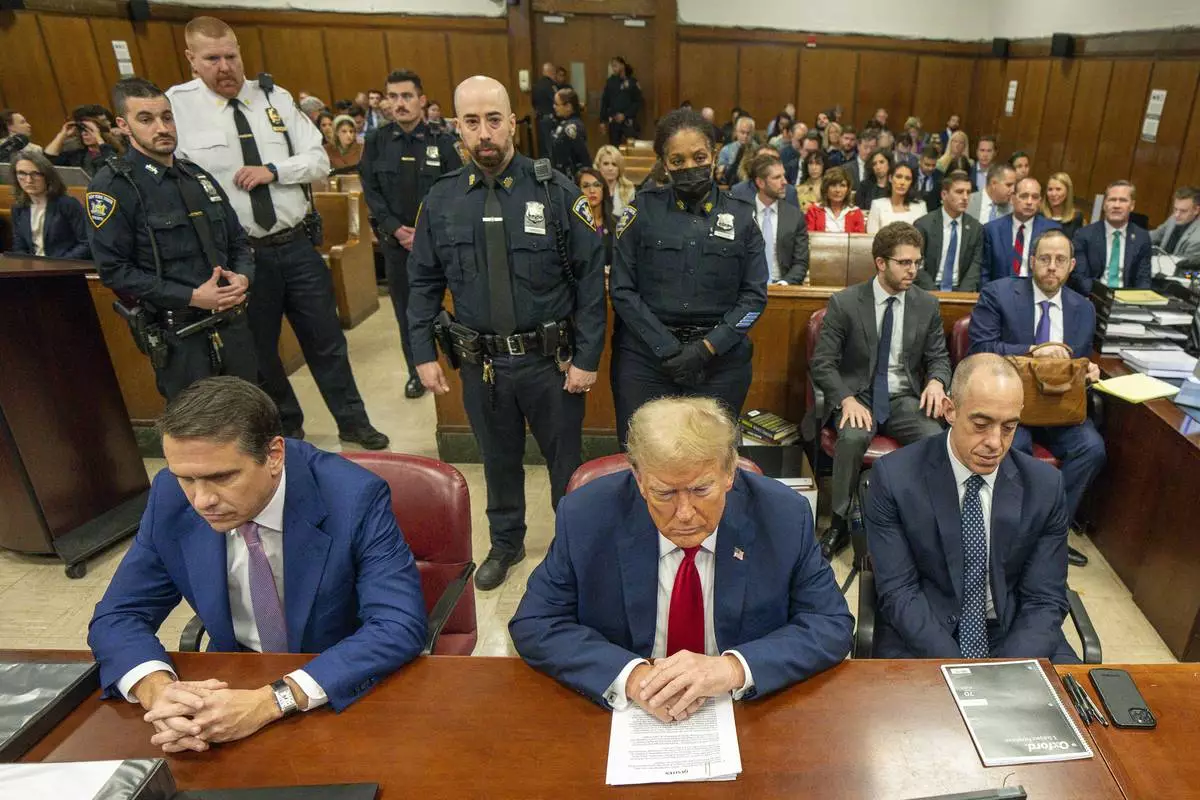
FILE - Former President Donald Trump appears at Manhattan criminal court before his trial in New York, May 16, 2024. Testimony in the hush money trial of Donald Trump is set to conclude in the coming days, putting the landmark case on track for jury deliberations that will determine whether it ends in a mistrial, an acquittal, or the first-ever felony conviction of a former American president. (Steven Hirsch/Pool Photo via AP, File)
HUNTSVILLE, Texas (AP) — The Texas Supreme Court halted Thursday night’s scheduled execution of a man who would have become the first person in the U.S. put to death for a murder conviction tied to a diagnosis of shaken baby syndrome.
The late-night ruling to spare for now the life of Robert Roberson, who was convicted of killing his 2-year-old daughter in 2002, capped a flurry of last-ditch legal challenges and weeks of public pressure from both Republican and Democratic lawmakers who say he is innocent and was convicted based on flawed evidence.
For hours on Thursday night, Roberson had remained in a prison holding cell a few feet from America's busiest death chamber at the Walls Unit in Hunstville.
"He praised God and thanked supporters,” said Texas Department of Criminal Justice spokesperson Amanda Hernandez, who spoke with Roberson after the court stayed his execution.
Although Texas' highest court normally does not weigh in on criminal cases, how it got involved in Roberson's case in the final hours underlined the extraordinary maneuvers used by a bipartisan coalition of state House lawmakers who have come to his defense.
Blocked by courts and Texas' parole board in their efforts to spare Roberson's life, legislators on Wednesday took a different route: issuing a subpoena for Roberson to testify before a House committee next week, days after he was scheduled to die by lethal injection.
Less than two hours before Roberson's execution, a judge in Austin granted the lawmakers an order upholding the subpoena, putting the execution on pause. An appeals court then briefly reversed that decision but was overruled by the high court's order.
“We're deeply grateful to the Texas Supreme Court for respecting the role of the Texas legislature in such consequential matters," Democratic Rep. Joe Moody and Republican Rep. Jeff Leach wrote in a joint statement.
Roberson, 57, was convicted of killing of his daughter, Nikki Curtis, in the East Texas city of Palestine. His lawyers and some medical experts say his daughter died not from abuse but from complications related to pneumonia.
Gov. Greg Abbott had authority to delay Roberson’s punishment for 30 days. Abbott has halted only one imminent execution in nearly a decade as governor and has not spoken publicly about the case.
Earlier Thursday, the U.S. Supreme Court refused to halt the execution, although Justice Sonia Sotomayor — in a 10-page statement about the case — urged Abbott to grant a 30-day delay.
Roberson’s lawyers had waited to see if Abbott would grant Roberson a one-time 30-day reprieve. It would have been the only action Abbott could take in the case as the Texas Board of Pardons and Paroles on Wednesday denied Roberson’s clemency petition.
The board voted unanimously, 6-0, to not recommend that Roberson’s death sentence be commuted to life in prison or that his execution be delayed. All board members are appointed by the governor. The parole board has recommended clemency in a death row case only six times since the state resumed executions in 1982.
The one time Abbott halted an imminent execution was when he spared the life of Thomas Whitaker in 2018.
The Texas committee on Wednesday held an all-day meeting on Roberson's case. In a surprise move at the end of the hearing, the committee issued a subpoena for Roberson to testify next week.
During its meeting in Austin, the committee heard testimony about Roberson’s case and whether a 2013 law created to allow people in prison to challenge their convictions based on new scientific evidence was ignored in Roberson’s case.
Anderson County District Attorney Allyson Mitchell, whose office prosecuted Roberson, told the committee a court hearing was held in 2022 in which Roberson’s attorneys presented their new evidence to a judge, who rejected their claims.
“Based on the totality of the evidence, a murder took place here. Mr. Roberson took the life of his almost 3-year-old daughter,” Mitchell said.
Most of the members of the committee are part of a bipartisan group of more than 80 state lawmakers, including at least 30 Republicans, who had asked the parole board and Abbott to stop the execution.
Roberson’s case has renewed debate over shaken baby syndrome, known in the medical community as abusive head trauma.
His lawyers as well as the Texas lawmakers, medical experts and others including bestselling author John Grisham say his conviction was based on faulty and now outdated scientific evidence. The diagnosis refers to a serious brain injury caused when a child’s head is hurt through shaking or some other violent impact, like being slammed against a wall or thrown on the floor.
Roberson’s supporters don’t deny head and other injuries from child abuse are real. But they say doctors misdiagnosed Curtis’ injuries as being related to shaken baby syndrome and that new evidence has shown the girl died from complications related to severe pneumonia.
Roberson’s attorneys say his daughter had fallen out of bed in Roberson’s home after being seriously ill for a week.
Roberson’s lawyers also suggested his autism, then undiagnosed at the time of his daughter’s death, was used against him as authorities became suspicious of him because of his lack of emotion over her death. Autism affects how people communicate and interact with others.
Follow Juan A. Lozano on X at https://x.com/juanlozano70.
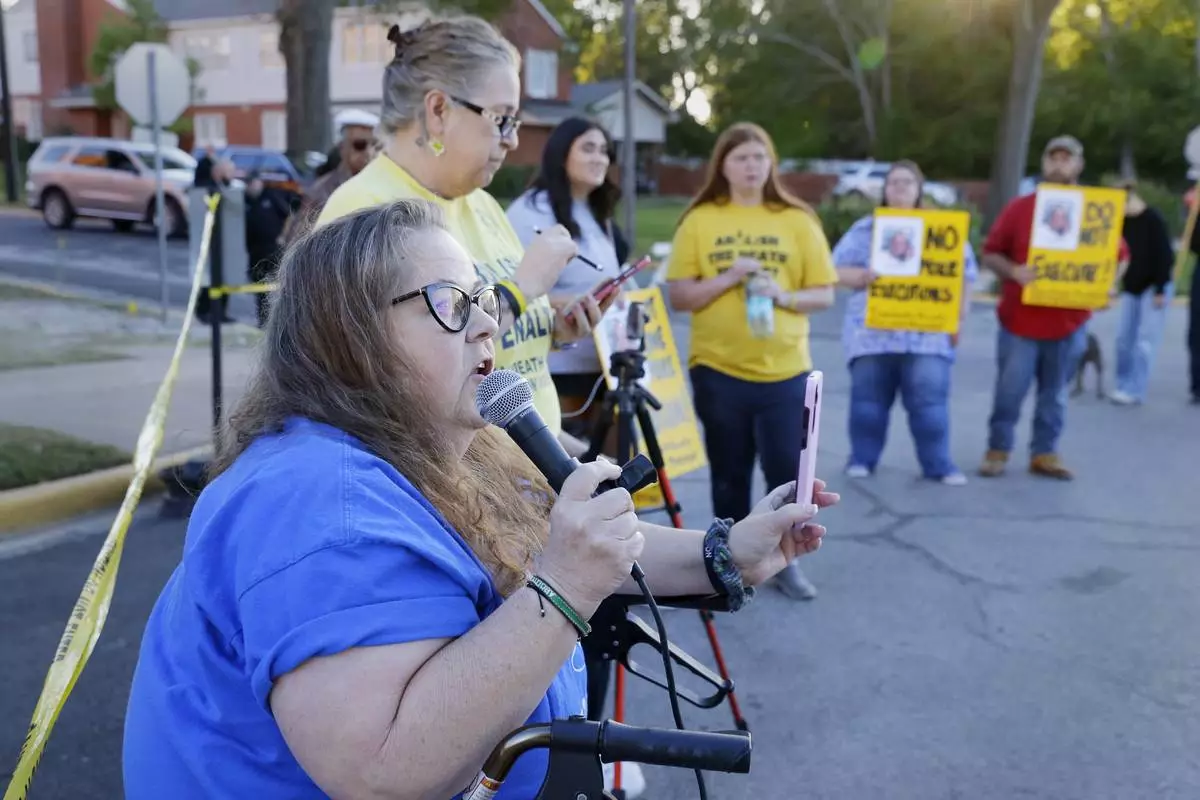
Dani Allen, an anti-death penalty advocate, speaks during a protest outside the prison where Robert Roberson is scheduled for execution at the Huntsville Unit of the Texas State Penitentiary, Thursday, Oct. 17, 2024, in Huntsville, Texas. (AP Photo/Michael Wyke)
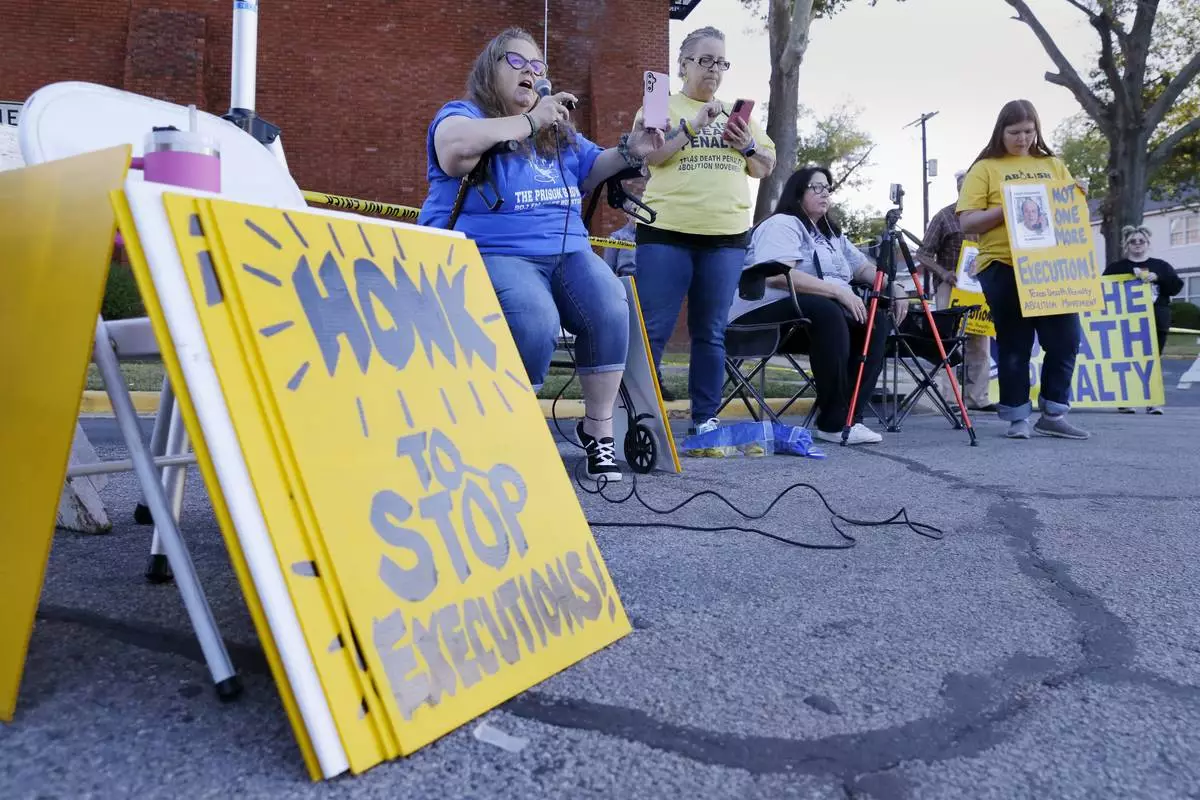
Dani Allen, center left with microphone, an anti-death penalty advocate, speaks during a protest outside the prison where Robert Roberson is scheduled for execution at the Huntsville Unit of the Texas State Penitentiary, Thursday, Oct. 17, 2024, in Huntsville, Texas. (AP Photo/Michael Wyke)
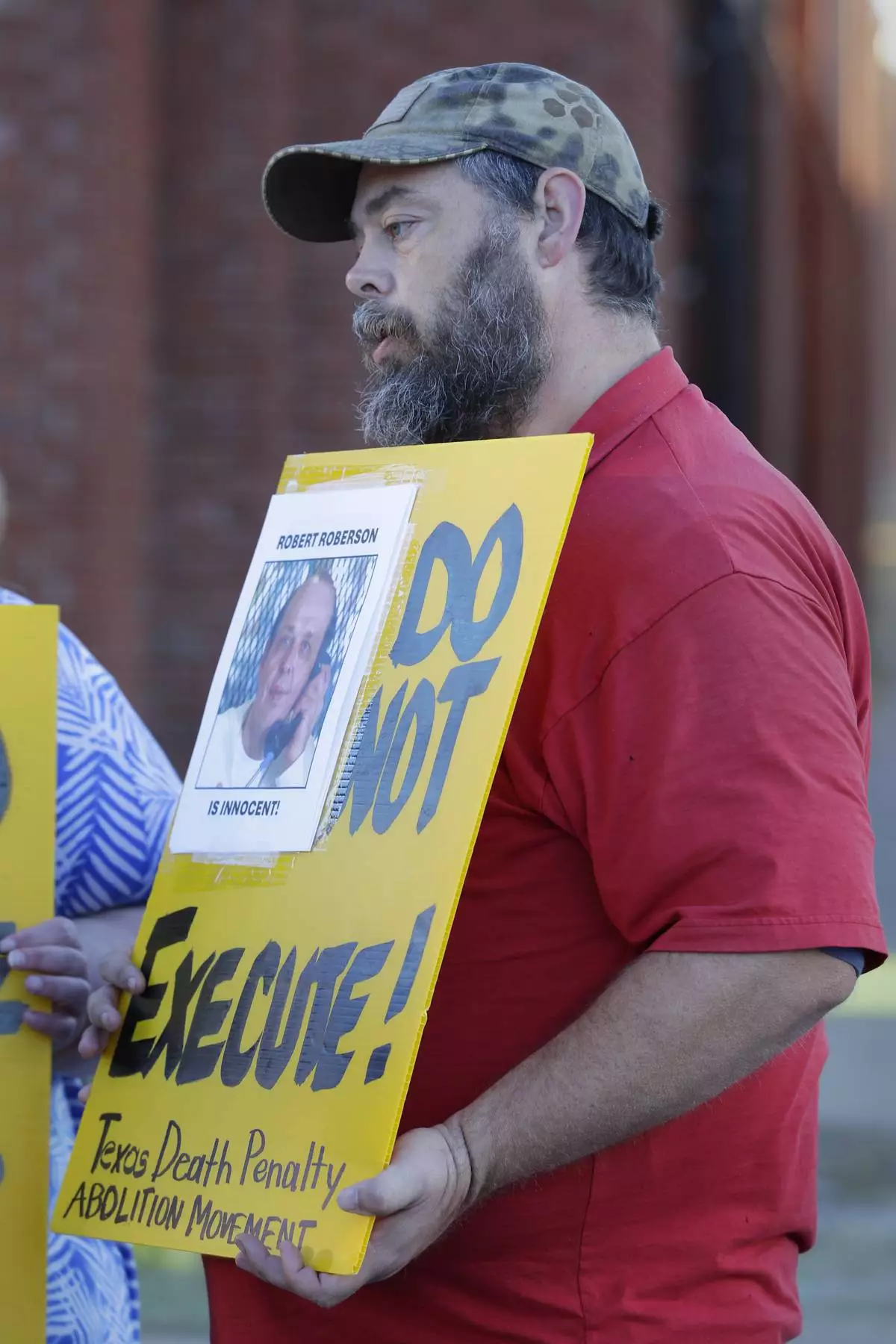
Thomas Roberson, older brother of condemned prisoner Robert Roberson, protests with others outside the prison where Roberson is scheduled for execution at the Huntsville Unit of the Texas State Penitentiary, Thursday, Oct. 17, 2024, in Huntsville, Texas. (AP Photo/Michael Wyke)
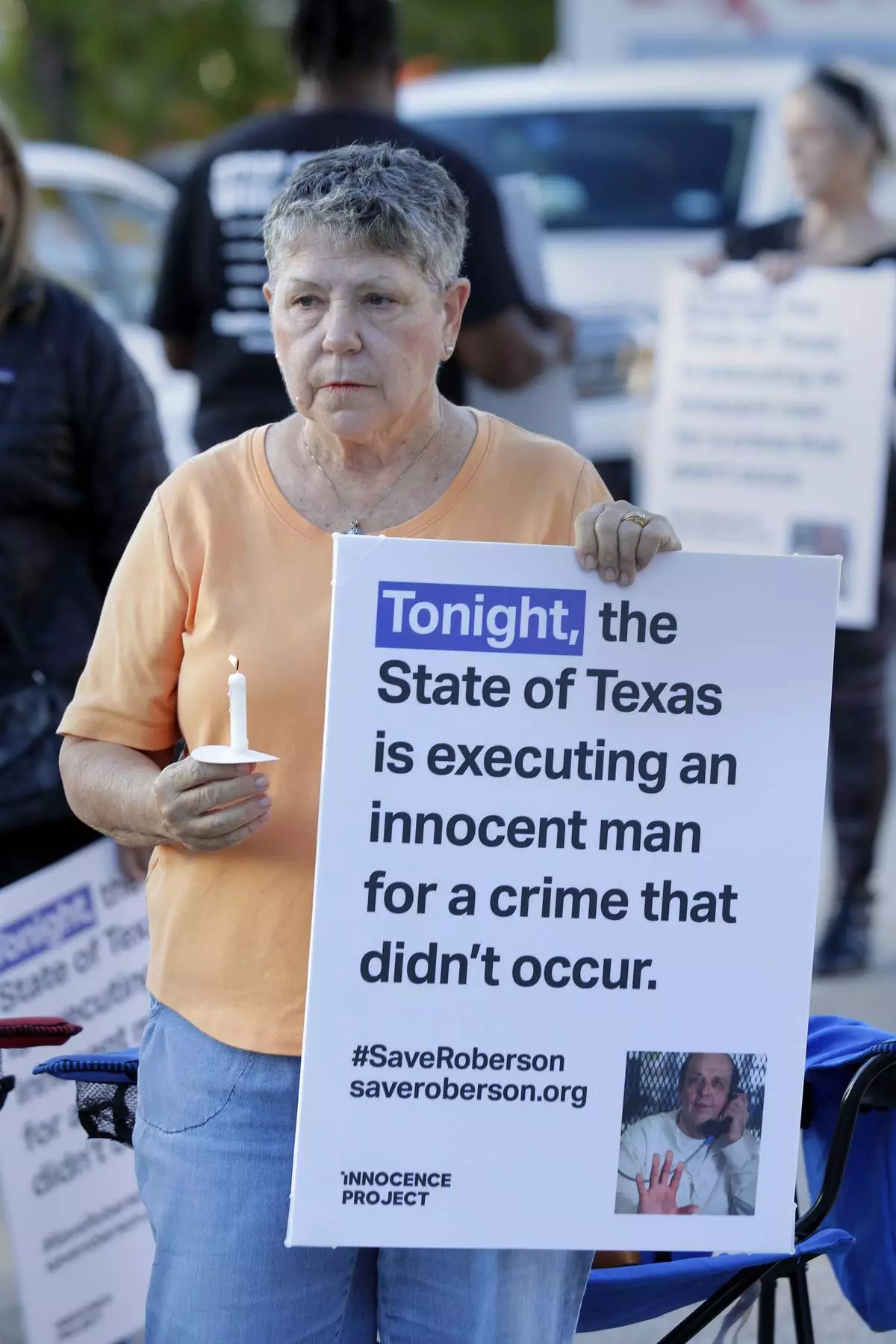
Ann Dorn, a local Catholic parishioner opposed to the death penalty, protest outside the prison where Robert Roberson is scheduled for execution at the Huntsville Unit of the Texas State Penitentiary, Thursday, Oct. 17, 2024, in Huntsville, Texas. (AP Photo/Michael Wyke)
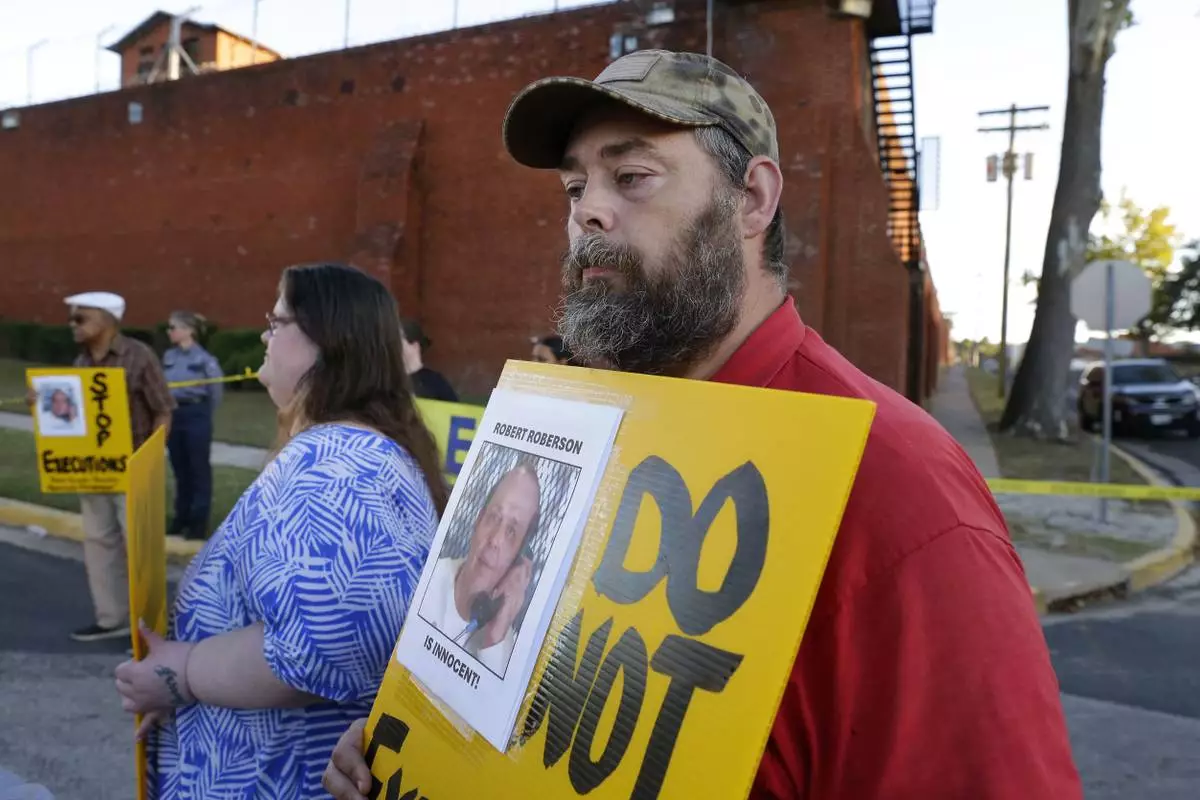
Thomas Roberson, right, older brother of condemned prisoner Robert Roberson, and Jennifer Martin, center left, holds signs with others as they protest outside the prison where Roberson is scheduled for execution at the Huntsville Unit of the Texas State Penitentiary Thursday, Oct. 17, 2024, in Huntsville, Texas. (AP Photo/Michael Wyke)
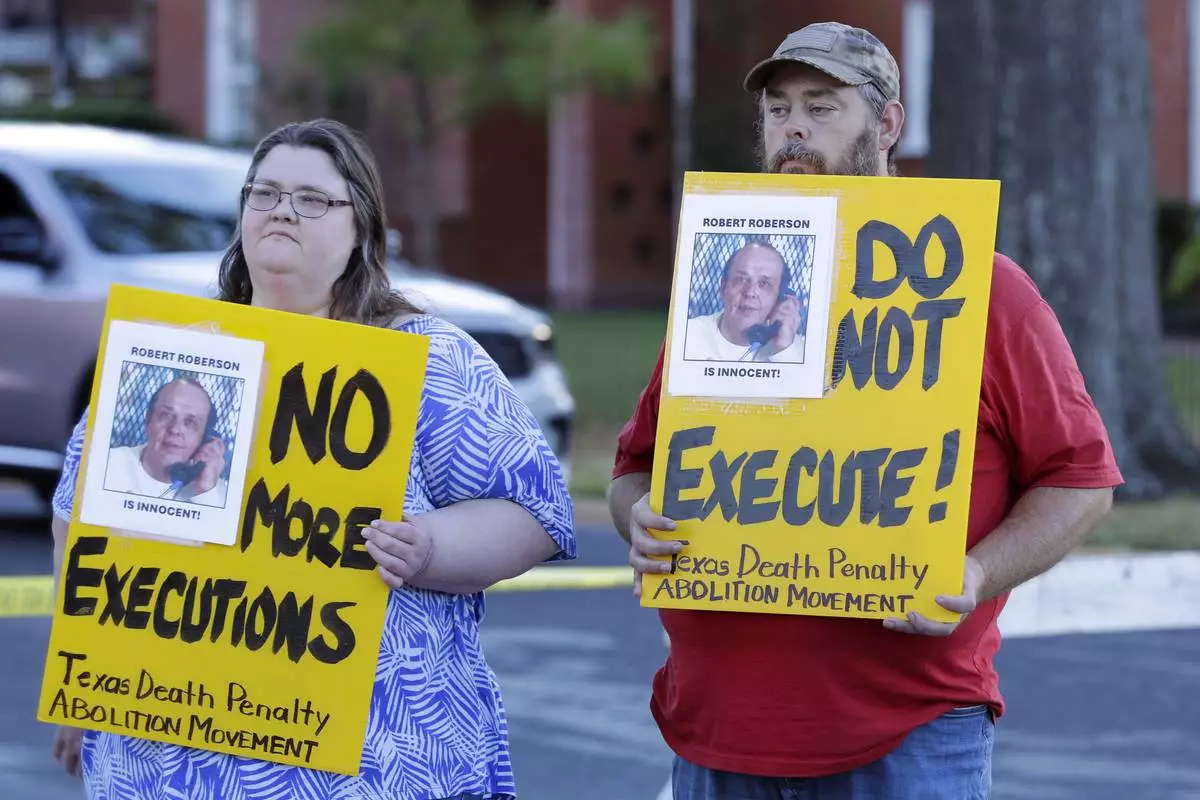
Jennifer Martin, left, and Thomas Roberson, older brother of condemned prisoner Robert Roberson, right, holds signs as they protest outside the prison where Roberson is scheduled for execution at the Huntsville Unit of the Texas State Penitentiary, Thursday, Oct. 17, 2024, in Huntsville, Texas. (AP Photo/Michael Wyke)
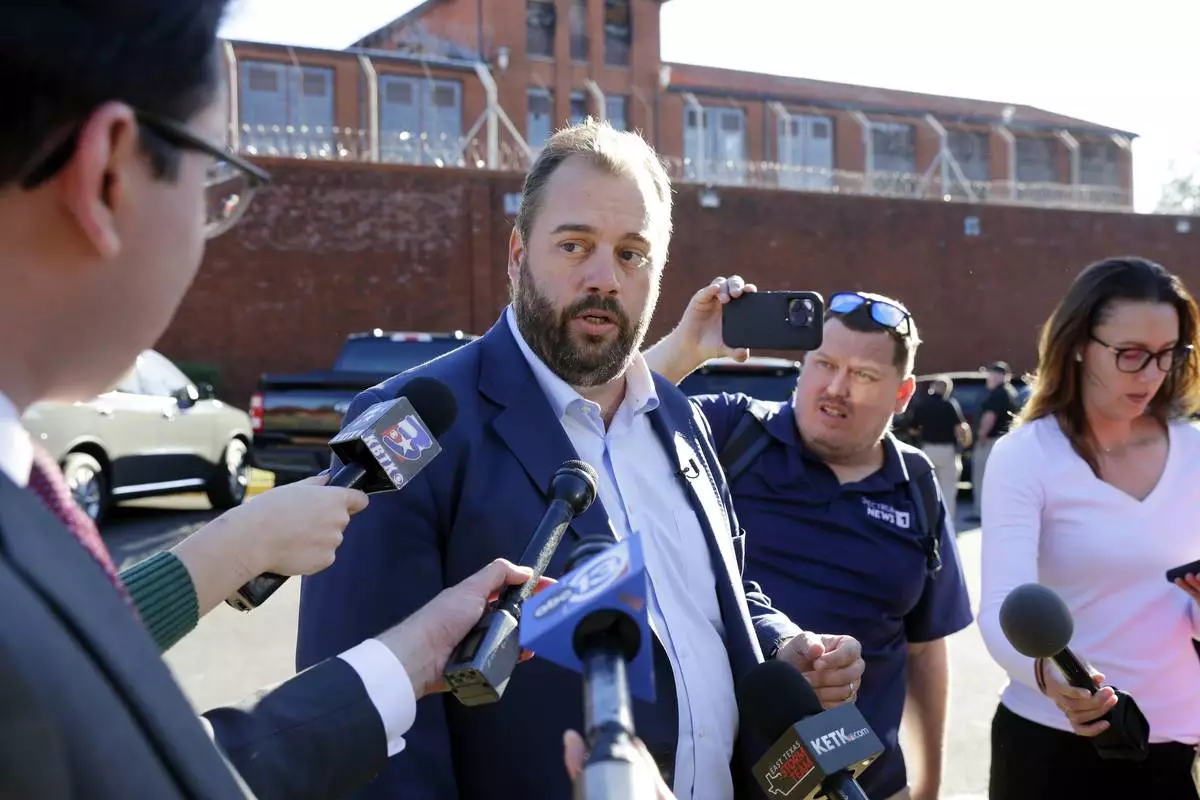
Texas State Rep. John Bucy III speaks to reporters on the pending execution of Robert Roberson during an impromptu press conference outside of the Huntsville Unit of the Texas State Penitentiary, Thursday, Oct. 17, 2024, in Huntsville, Texas. (AP Photo/Michael Wyke)
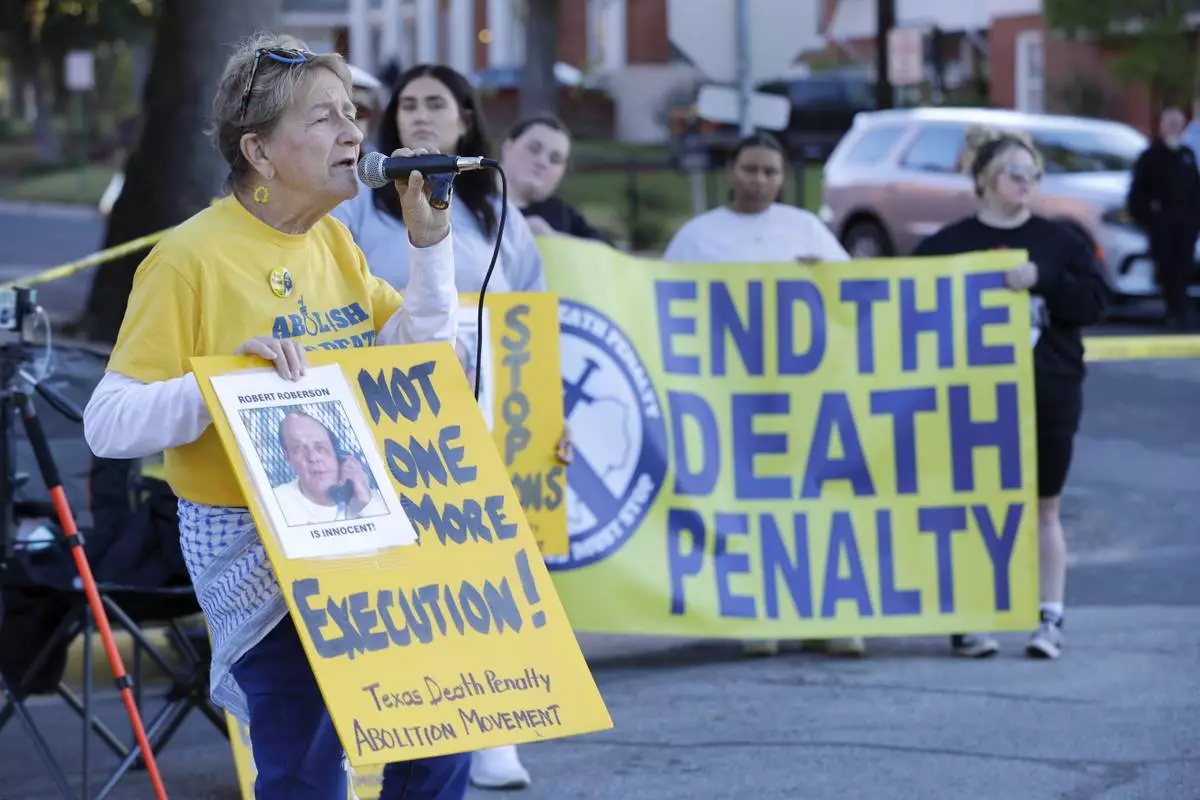
Gloria Rubac, left, an anti-death penalty activist, speaks during a protest outside the prison where Robert Roberson is scheduled for execution at the Huntsville Unit of the Texas State Penitentiary, Thursday, Oct. 17, 2024, in Huntsville, Texas. (AP Photo/Michael Wyke)
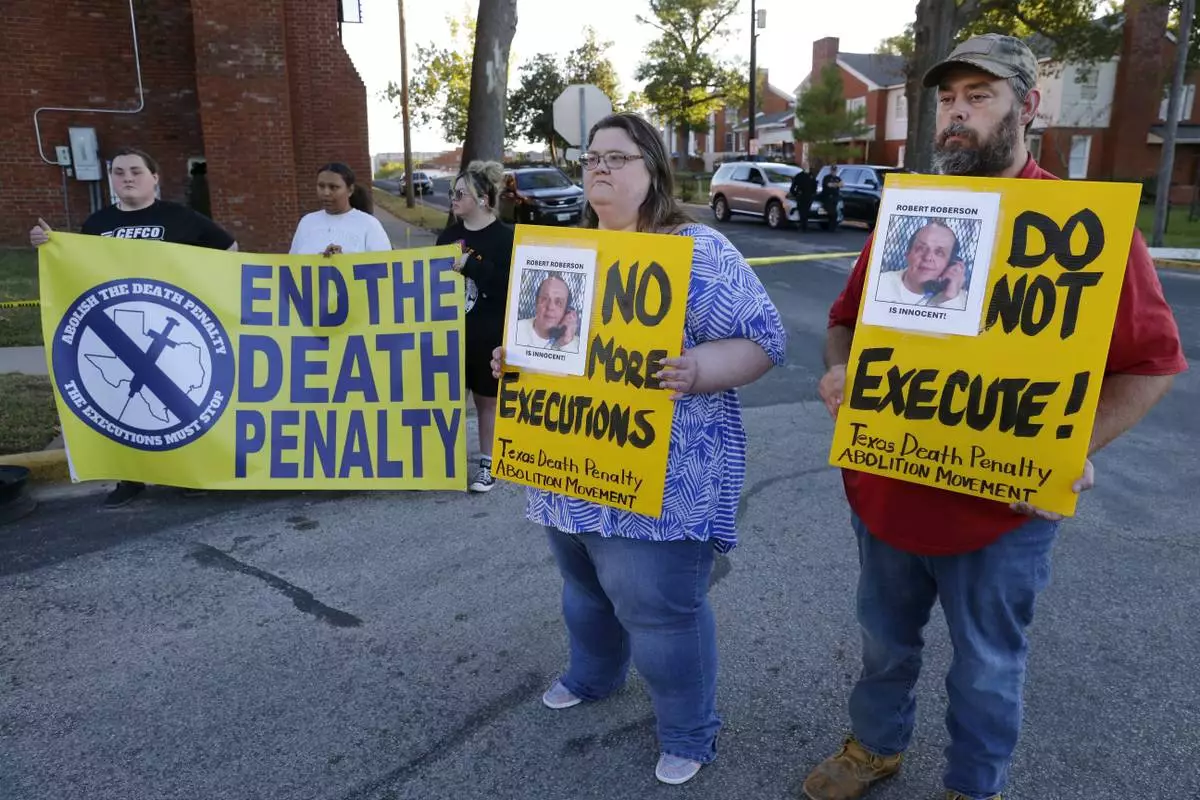
Jennifer Martin, center, and Thomas Roberson, right, older brother of condemned prisoner Robert Roberson, holds signs with others as they protest outside the prison where Roberson is scheduled for execution at the Huntsville Unit of the Texas State Penitentiary, Thursday, Oct. 17, 2024, in Huntsville, Texas. (AP Photo/Michael Wyke)
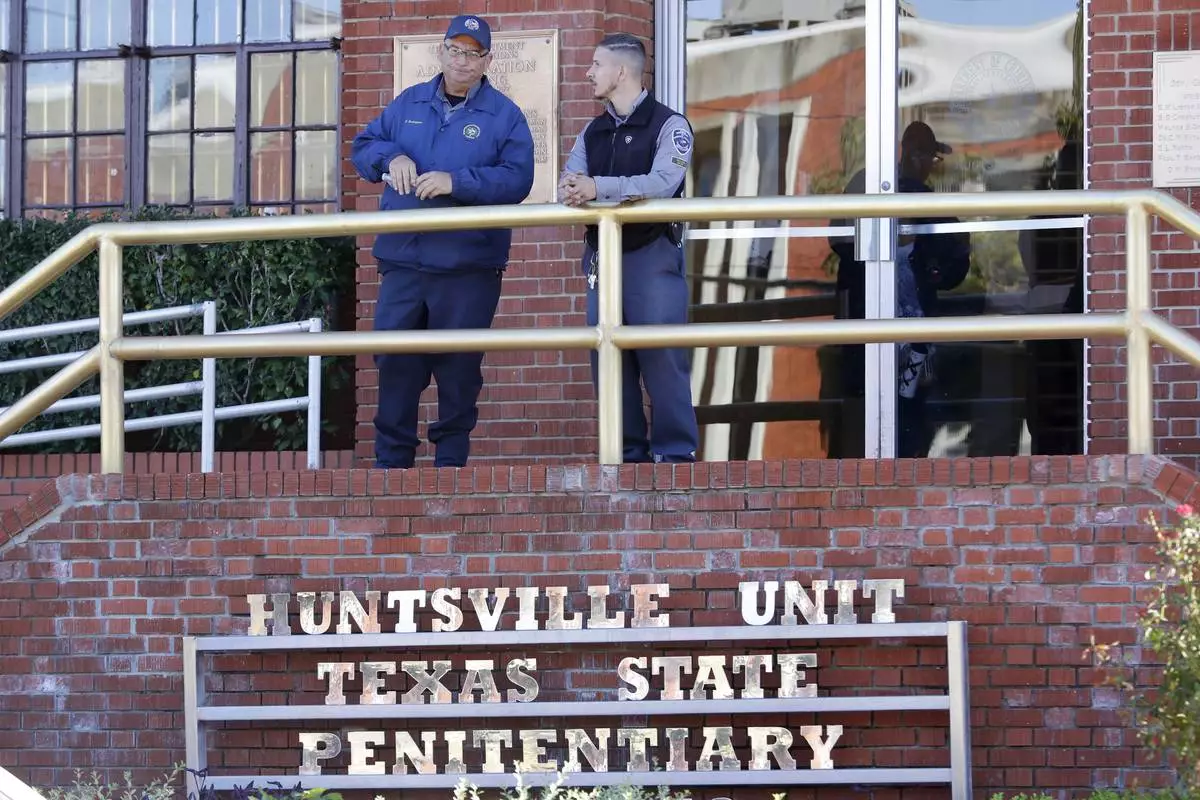
Prison staff gather at the main entrance of the building housing the execution chamber as Robert Roberson awaits his execution, at the Huntsville Unit of the Texas State Penitentiary, Thursday, Oct. 17, 2024, in Huntsville, Texas. (AP Photo/Michael Wyke)
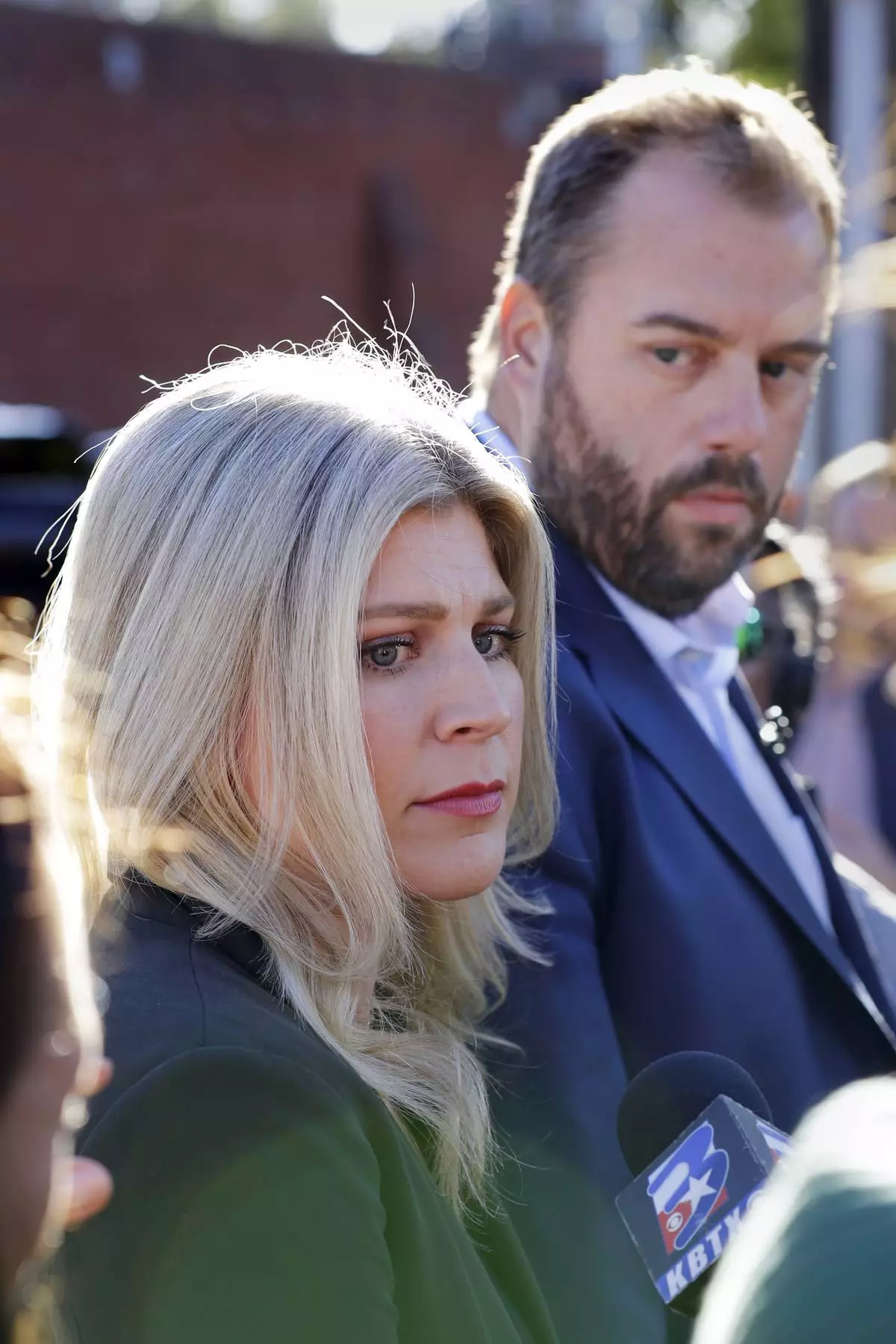
Texas state representatives Lacey Hull, left, and John Bucy III, speak to reporters on the pending execution of Robert Roberson during an impromptu press conference outside of the Huntsville Unit of the Texas State Penitentiary, Thursday, Oct. 17, 2024, in Huntsville, Texas. (AP Photo/Michael Wyke)
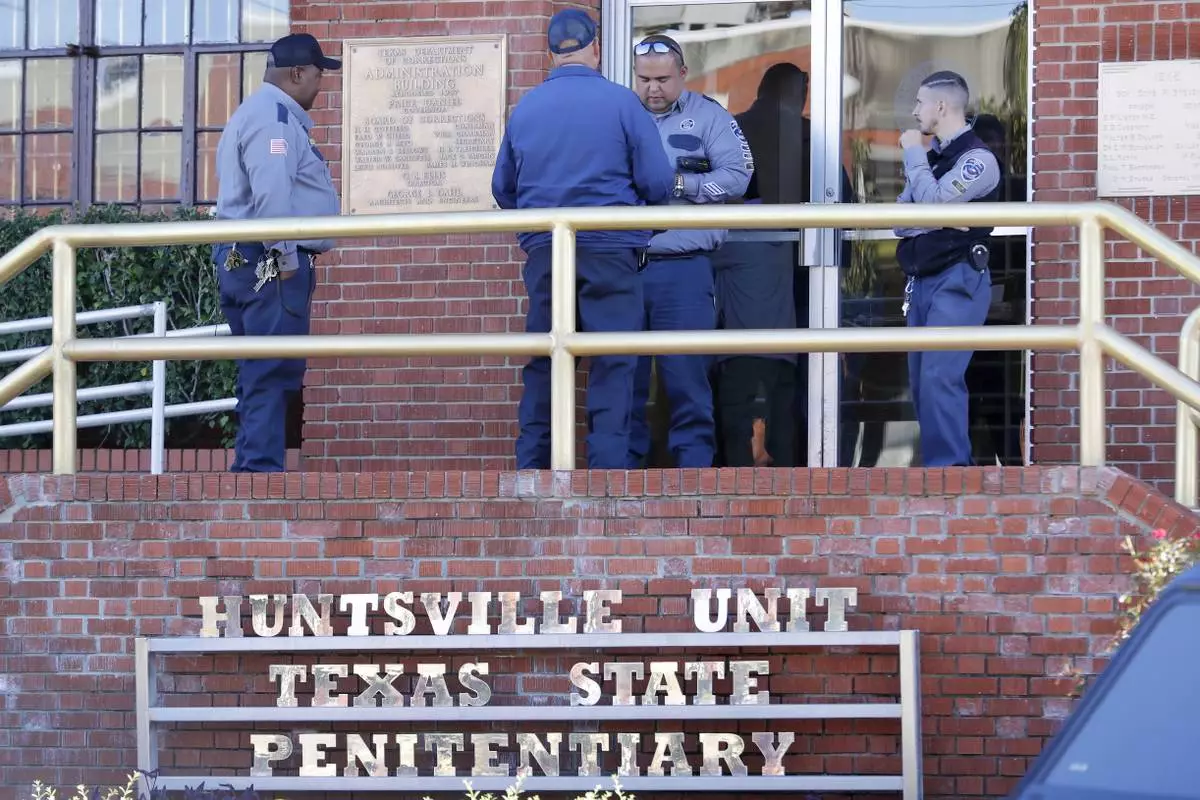
Prison staff gather at the main entrance of the building housing the execution chamber as Robert Roberson awaits his execution, at the Huntsville Unit of the Texas State Penitentiary, Thursday, Oct. 17, 2024, in Huntsville, Texas. (AP Photo/Michael Wyke)
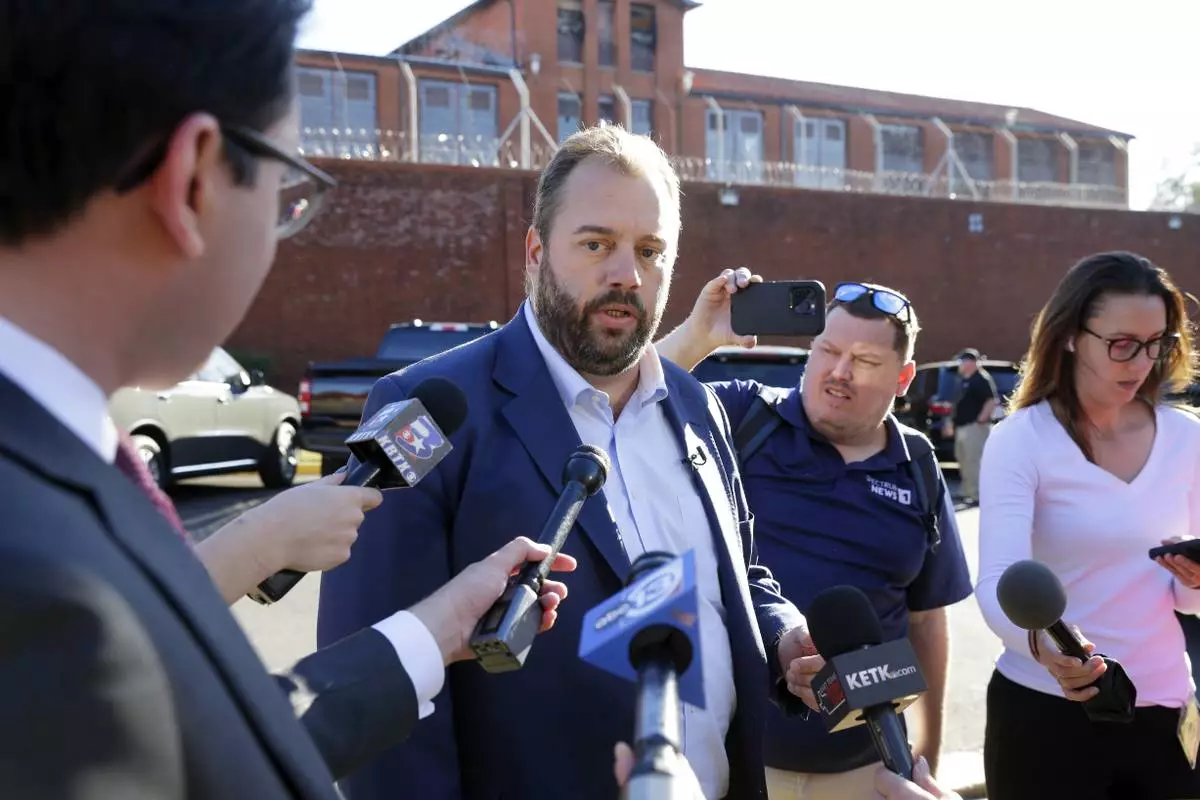
Texas State Rep. John Bucy III speaks to reporters on the pending execution of Robert Roberson during an impromptu press conference outside of the Huntsville Unit of the Texas State Penitentiary, Thursday, Oct. 17, 2024, in Huntsville, Texas. (AP Photo/Michael Wyke)
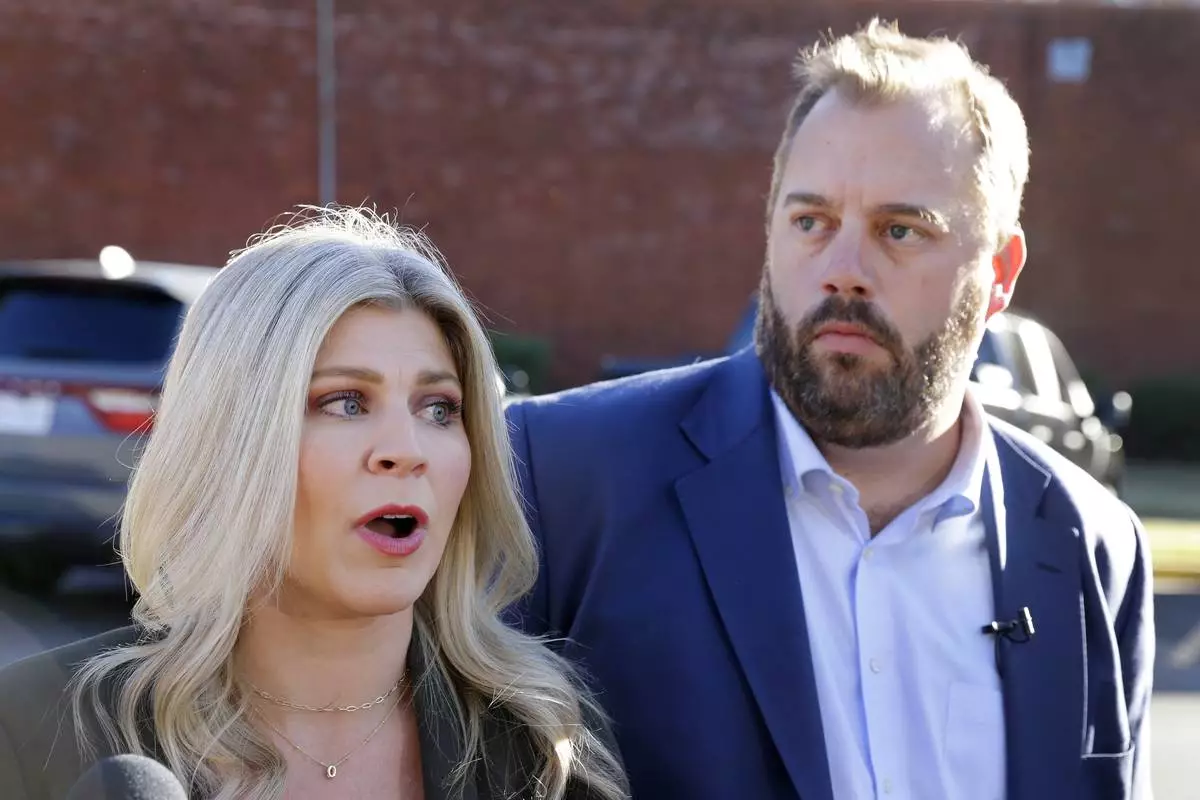
Texas state representatives Lacey Hull, left, and John Bucy III, speak to reporters on the pending execution of Robert Roberson during an impromptu press conference outside of the Huntsville Unit of the Texas State Penitentiary, Thursday, Oct. 17, 2024, in Huntsville, Texas. (AP Photo/Michael Wyke)
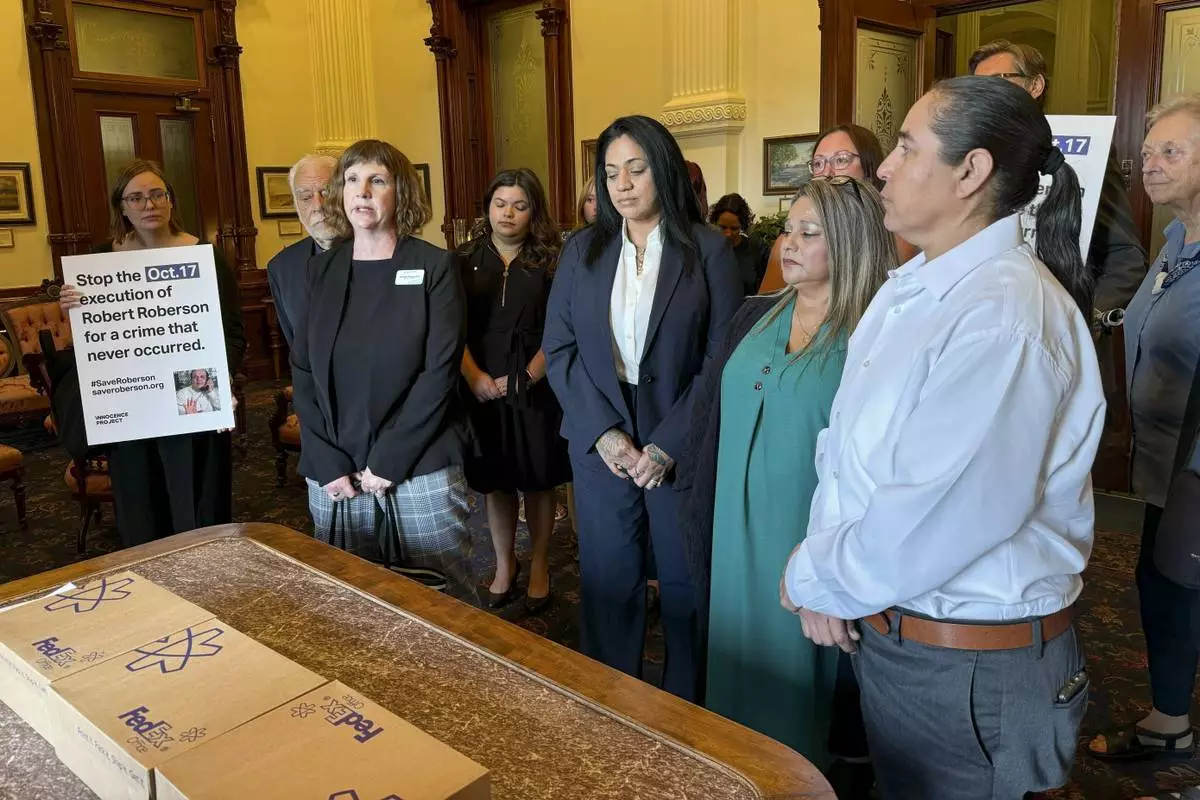
Elizabeth Ramirez, center, Casandra Rivera, center right, and Anna Vasquez, second from right, of the "San Antonio 4" group, deliver boxes with petitions in the Texas State capitol for Texas Gov. Greg Abbott seeking the pardoning of Robert Roberson's execution, Wednesday, Oct. 16, 2024, in Austin, Texas. Roberson, 57, is scheduled to receive a lethal injection on Oct. 17, for the 2002 killing of his 2-year-old daughter, Nikki Curtis, in the East Texas city of Palestine. Roberson has long proclaimed his innocence. (AP Photo/Nadia Lathan)
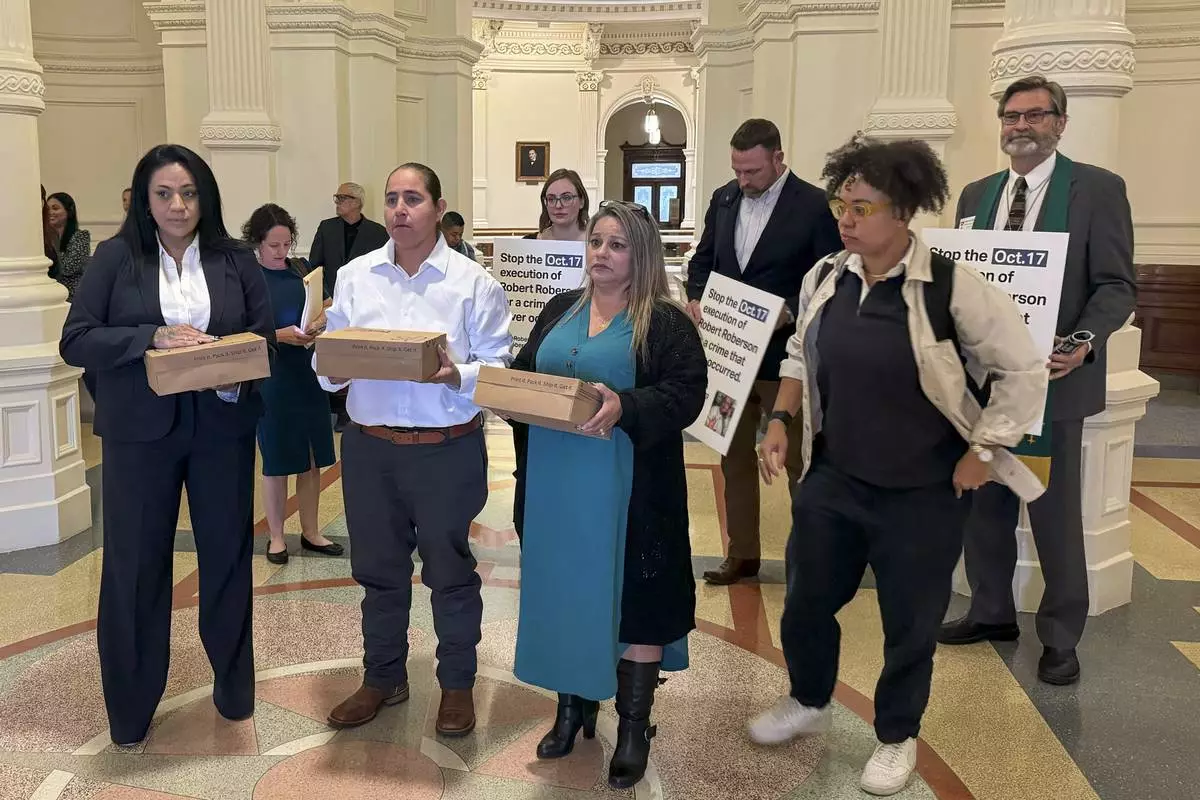
Casandra Rivera, left, Anna Vasquez, second from left, and Elizabeth Ramirez, center, of the "San Antonio 4" group, hold boxes with petitions being delivered in the Texas State capitol for Texas Gov. Greg Abbott seeking the pardoning of Robert Roberson's execution, Wednesday, Oct. 16, 2024 in Austin, Texas. Roberson, 57, is scheduled to receive a lethal injection on Oct. 17, for the 2002 killing of his 2-year-old daughter, Nikki Curtis, in the East Texas city of Palestine. Roberson has long proclaimed his innocence. (AP Photo/Nadia Lathan)
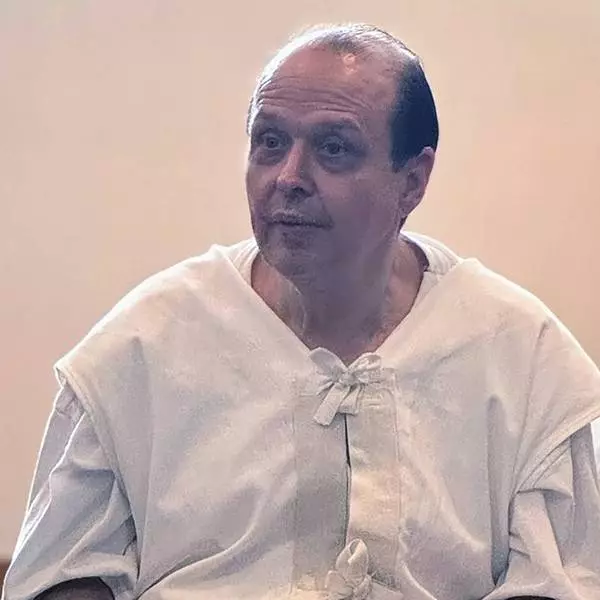
Texas man set to be first in US executed over shaken baby syndrome makes last appeals
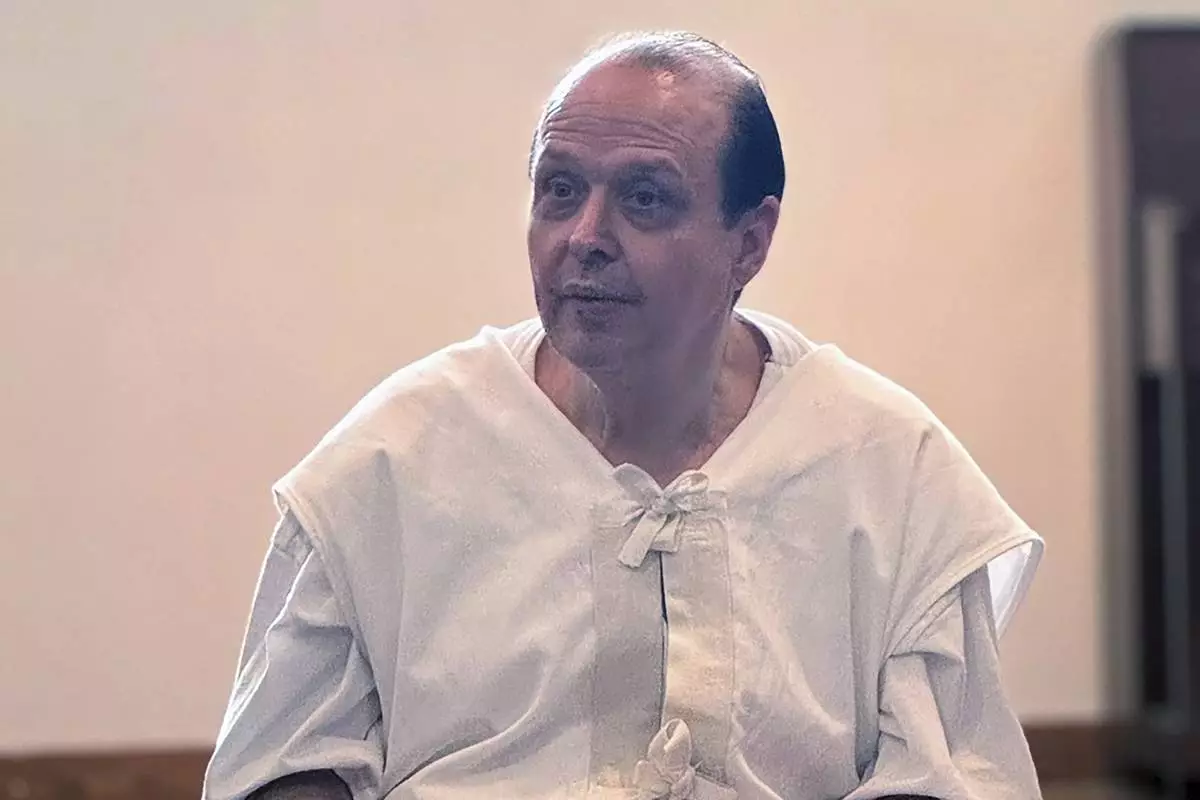
FILE - Texas lawmakers meet with Robert Roberson at a prison in Livingston, Texas, Sept. 27, 2024. (Criminal Justice Reform Caucus via AP, File)
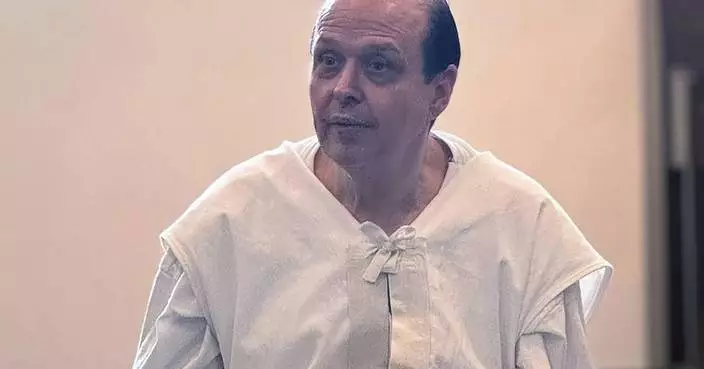
Texas man set to be first in US executed over shaken baby syndrome makes last appeals






